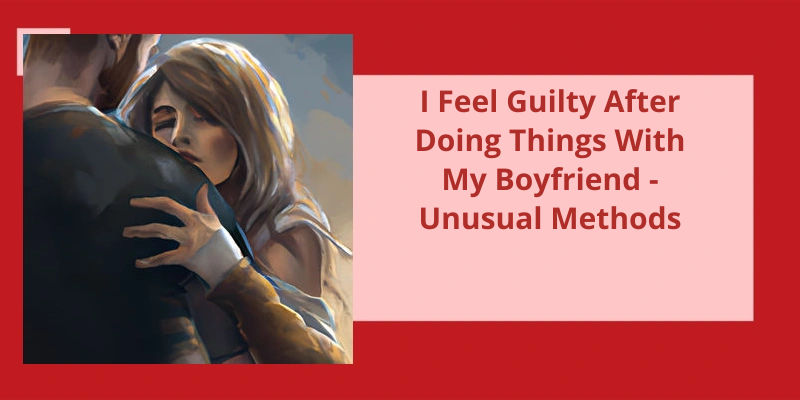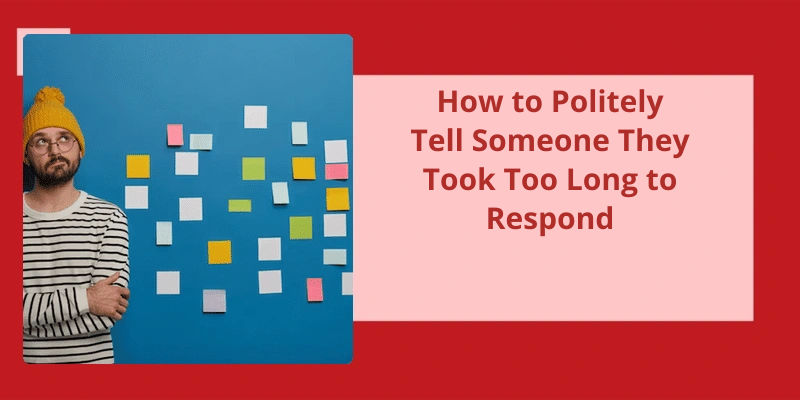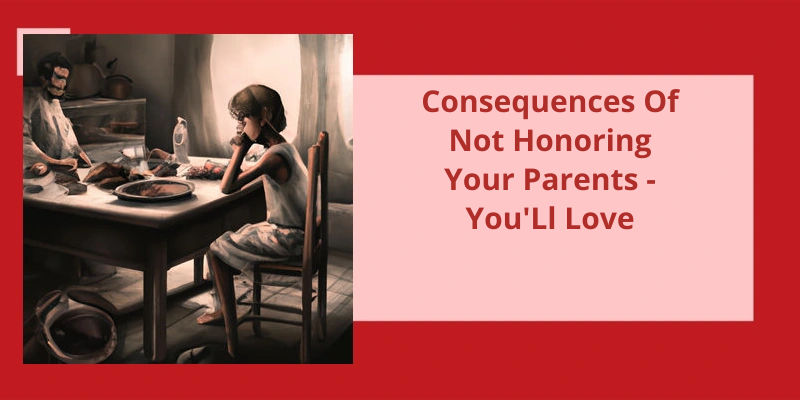Navigating relationships can be a complex and emotionally tumultuous journey, filled with moments that can leave us feeling conflicted and burdened with guilt. This is especially true when it comes to engaging in intimate activities with our partners. For some, the experience of guilt after indulging in such acts isn’t uncommon, and it can stem from a variety of sources. Whether it be societal conditioning, personal beliefs, or internalized shame, these feelings can have a profound impact on our emotional well-being and the dynamics of the relationship itself. However, there are ways to address this guilt and explore unconventional methods that may help alleviate those burdensome emotions. By gaining a deeper understanding of our personal values, communicating openly with our partners, and engaging in self-reflection, we can begin to untangle the complexities of guilt and create healthier, more fulfilling relationships.
How Guilt Destroys Relationships?
Guilt has the power to silently erode the foundation of relationships, leaving individuals feeling deprived of respect and love. When we constantly feel guilt after doing things with our significant other, it can begin to hinder the growth and strength of the connection. While it’s normal to occasionally experience guilt in relationships, allowing it to persist can have detrimental consequences.
Constantly feeling guilty over ones actions or choices can lead to self-doubt and a lack of confidence. This, in turn, can negatively impact the ability to assert oneself and maintain open communication.
In order to avoid the destructive cycle of guilt, individuals must address and communicate their feelings openly. It’s essential to express ones needs and concerns without guilt overshadowing the conversation. By fostering an environment of mutual respect and understanding, partners can work together to find healthy solutions and establish a balance that honors both individuals emotional well-being. Ultimately, it’s essential to prioritize ones own happiness and emotional health, as this will contribute to the overall strength and longevity of the relationship.
Guilt in a relationship can weigh heavily on our hearts and minds, often leading to feelings of remorse and even self-blame. However, it’s important to remember that dwelling on guilt can hinder personal growth and hinder the potential for relationship repair. By developing self-regulation skills, practicing mindfulness, and embracing forgiveness, it’s possible to overcome these feelings and move forward in a positive way.
How Do I Stop Feeling Guilty About Ruining My Relationship?
It’s not uncommon to feel guilty after doing things with your boyfriend that you may perceive as negatively impacting your relationship. However, dwelling on these feelings of guilt can be detrimental to your mental and emotional wellbeing. To stop feeling guilty about potentially ruining your relationship, try implementing some unusual methods that can help you navigate through these emotions.
One way to deal with guilt in a relationship is by developing better self-regulation skills. This involves recognizing when youre feeling guilty and taking the necessary actions to address the situation. Instead of letting guilt eat away at you, try speaking openly and honestly with your boyfriend about your concerns. By communicating effectively, you can work together to find solutions and reassure each other.
Another helpful approach is to practice mindfulness and meditation. These techniques can assist in putting your guilt into perspective and quieting your negative thoughts. By bringing yourself into the present moment and focusing on your breath, you can create space to observe your feelings without judgment. This can help you detach from the guilt and gain a better understanding of what lies beneath it.
It’s also important not to be too hard on yourself and learn forgiveness. Remember that everyone makes mistakes, and it’s essential to forgive yourself for any perceived missteps. Instead of being consumed by guilt, use it as an opportunity to learn and grow. Reflect on your actions, understand why you made certain choices, and commit to making positive changes moving forward.
Furthermore, learn from your guilt and your mistakes. Rather than wallowing in self-blame, try to see your guilt as a valuable teacher. Consider the impact your actions may have had on your relationship and how you can avoid making the same mistakes in the future. By adopting a growth mindset, you can focus on personal development and becoming a better partner.
By developing self-regulation skills, practicing mindfulness, and forgiving yourself, you can manage your guilt in a healthy way.
Source: The Signs & Effects of Guilt in Relationships
However, guilt in relationships can manifest in various other ways as well. It can be seen when one partner constantly criticizes or belittles the other, making them doubt themselves and feel guilty for not meeting their expectations. Manipulative behavior, such as emotional blackmail or gaslighting, can also induce guilt by making the other person question their own perceptions and feelings. These examples demonstrate how guilt can be used as a tool to control and manipulate the dynamics of a relationship.
What Are Examples of Guilt in Relationships?
Another example of guilt in relationships is manipulation. They may say things like, “If you really loved me, you’d do this for me,” or “I sacrificed so much for you, you owe me.”. These statements make the other person feel guilty and obligated to fulfill their partners wishes, even if it goes against their own desires or boundaries.
Guilt can also arise from comparison. In a relationship, comparing oneself to others can lead to feelings of inadequacy and guilt. For example, if one partner constantly compares their looks, achievements, or success to someone else, the other partner may start feeling guilty for not measuring up. This can create a toxic environment where both individuals feel constantly judged and inadequate.
Unmet expectations can also generate guilt. When one partner has specific expectations of how the other should act, behave, or prioritize, it can lead to guilt when those expectations aren’t met. For instance, if one partner expects their significant other to always prioritize them over friends or work, and they dont, the other person may feel guilty for letting them down.
When one person blames their partner for their own unhappiness or dissatisfaction, it can lead to feelings of guilt in the other person. They may start to believe that they’re responsible for their partners emotions and actions, even if they’ve done nothing wrong.
Lastly, secrets and lies can cause guilt in relationships. If one partner is keeping secrets or lying about their actions, the other person may start to feel guilty for not being able to trust their partner completely. They may question themselves and wonder if they did something wrong to make their partner feel the need to hide things from them.
It’s essential to address and communicate these feelings with your partner and seek a healthy resolution.
The constant burden of guilt can be a heavy weight to carry, especially when it isn’t justified. Many individuals find themselves grappling with toxic or chronic guilt, often rooted in a distorted perception of responsibility. These feelings can trace back to their upbringing and persist throughout their adult lives, infiltrating various aspects of their relationships and leaving them perpetually plagued by misplaced guilt.
Why Do I Always Feel Guilty for Things That Are Not My Fault?
Why do I always feel guilty for things that aren’t my fault? This question has plagued many individuals who struggle with chronic guilt, also known as toxic guilt. This deep-rooted feeling often stems from their childhood environment, where they were made to believe they were responsible for others feelings and actions. Consequently, this sense of responsibility follows them into adulthood and affects their relationships, whether romantic, professional, or otherwise. The burden of guilt can be overwhelming, leading to self-doubt and a constant need to apologize or seek forgiveness.
This distorted sense of responsibility not only impacts personal relationships but can also affect professional life. Those who harbor chronic guilt may take on more tasks or assume blame for mistakes made by others in the workplace. They may fear disappointing others or believe that they must always fix the problems they encounter, regardless of whether they played a role in causing them.
To break free from this toxic guilt, individuals must challenge and reframe their beliefs about responsibility. Therapy or counseling can be beneficial in unraveling these deeply ingrained patterns of guilt and learning healthier coping mechanisms. Additionally, practicing self-compassion and setting boundaries is crucial.
By seeking support and challenging these ingrained beliefs, individuals can cultivate a healthier sense of self and foster more balanced relationships with themselves and others.
Understanding the Origins of Toxic Guilt: Exploring How Childhood Experiences and Family Dynamics Can Contribute to Chronic Feelings of Guilt.
Understanding the origins of toxic guilt is crucial in exploring chronic feelings of guilt that arise after doing things with a boyfriend. Childhood experiences and family dynamics play a significant role in shaping our emotional responses as adults. Guilt can stem from strict upbringing, excessive criticism, or unrealistic expectations from parents or caregivers. These experiences can create a sense of never feeling good enough, which carries over into relationships. By recognizing these underlying factors, individuals can begin to address and challenge the toxic guilt, allowing for healthier emotional experiences and relationships.
Continuing to endure guilt trips in a relationship can gradually erode the foundation on which love, trust, and understanding are built. When faced with continuous manipulation through guilt, it becomes increasingly challenging to maintain a healthy dynamic, as resentment takes root and festers within.
Is Guilt-Tripping Toxic in a Relationship?
Is guilt-tripping toxic in a relationship? One of the reasons why guilt trips can poison relationships is because they can lead to lasting feelings of resentment. A single occasion of someone using a guilt trip to alter your behavior might not have a serious impact on your relationship. Repeated use of guilt trips can leave you feeling bitter. Over time, the accumulation of guilt trips can erode trust and create a toxic dynamic where one person holds power over the other by manipulating their emotions.
It may also be beneficial to seek professional help, such as couples therapy, to learn healthier communication strategies. Both partners should feel safe expressing their needs and emotions without fear of manipulation or coercion.
How to Identify Guilt-Tripping Behavior in a Relationship
Guilt-tripping behavior in a relationship can be emotionally manipulative and damaging. Here are some signs to help you identify guilt-tripping behavior:
- Constantly making you feel guilty for things you haven’t done or shouldn’t feel guilty about.
- Using emotional manipulation to make you feel responsible for their feelings or actions.
- Playing the victim and using guilt to gain control or get what they want.
- Invalidating your feelings and making you doubt yourself.
- Using passive-aggressive behavior or indirect communication to indirectly guilt you.
- Refusing to take responsibility for their own actions and making you feel guilty instead.
If you notice these behaviors in your relationship, it’s important to communicate your concerns and set boundaries. Healthy relationships are built on mutual respect and understanding, not guilt and manipulation.
These self-doubts and feelings of guilt often stem from a lack of self-esteem or a fear of not being good enough. It’s important to remember that relationships are a partnership, and both individuals contribute to it’s success. Understanding and addressing these underlying issues can help alleviate the guilt and foster a healthier, more fulfilling relationship.
Why Do I Feel Guilty When I’m With My Partner?
.”. These feelings of guilt can stem from a variety of sources, including past experiences, insecurities, and societal pressures.
One possible reason for feeling guilty in a relationship is the fear of not living up to your partners expectations. You might worry that you aren’t fulfilling their needs or that you aren’t as compatible as you should be. This can cause you to question your own worth and feel guilty for not being “enough” for your partner. Insecurities about your own value and self-worth can often contribute to these feelings.
Past experiences, such as previous relationship failures or betrayals, can also contribute to feelings of guilt in your current relationship. You might be carrying past baggage and projecting it onto your current partner. This can lead to an irrational belief that you’re destined to make the same mistakes again, causing you to feel guilty for potentially hurting your partner.
However, regularly questioning your worth and your compatibility with your partner can be detrimental to your mental and emotional wellbeing. It’s crucial to communicate openly with your partner about your feelings and to seek support from loved ones or a therapist to unpack your guilt and work through any underlying issues. Remember, it’s possible to find a healthy balance between being the best version of yourself and being a supportive partner.
The Role of Past Trauma in Feelings of Guilt in Relationships
When it comes to feeling guilty in a relationship, past trauma can often play a significant role. Past traumatic experiences can have a lasting impact on an individual’s emotional well-being and their ability to trust and connect with others.
If someone has experienced trauma in their past, they may carry feelings of shame, fear, or guilt with them into their current relationship. Certain actions or behaviors with their boyfriend may trigger these unresolved emotions, leading to feelings of guilt.
It’s important to recognize that these feelings aren’t always rational or directly linked to the present situation. Trauma can create a distorted perception of reality, causing individuals to feel guilty even when they’ve done nothing wrong.
Addressing these feelings of guilt requires open communication and support from both partners. Creating a safe space for open dialogue about past experiences can help build understanding and empathy. Seeking therapy or counseling may also be beneficial in processing past trauma and managing feelings of guilt in relationships.
Conclusion
In conclusion, the feeling of guilt after engaging in intimate activities with a partner is a complex and personal experience that requires understanding and self-reflection. While societal norms and personal beliefs can influence these feelings, it’s important to recognize that one's emotions are valid and should be acknowledged. Rather than seeking validation from external sources, individuals should focus on open and honest communication with their partner, as well as self-compassion and self-acceptance. Finding healthy ways to process and navigate these emotions is essential for cultivating a fulfilling and guilt-free relationship. Remember, each person's journey is unique, and it’s crucial to prioritize personal well-being and emotional growth throughout this process.






